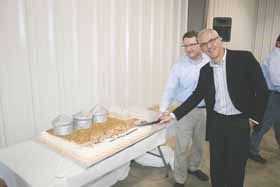The Louis Dreyfus Commodities canola crushing plant celebrated a major achievement last week.
Opening in 2009, the plant, which shipped its first 100-car unit of meal in April 2011, recently shipped its 100th 100-car trainload of canola meal.
"It's a real milestone for us here in Canada," said spokesperson Brian Conn during a presentation at the plant last Tuesday (Sept. 16). He explained the historic train rolled out June 11, headed for a dairy producer in California.
" What I marvel at is how much has been done in three short years," he said, adding such movements have an impact on the bottom line for farmers "and on our economy as a whole."
The idea of 100-car unit trains, while common enough in terms of cereal grain movement, were unheard of for canola meal until recent large scale crushers came on line with the ability to produce the sorts of tonnages needed for the large unit trains, explained Conn.
Fifty-five to 57 per cent of the actual canola seed crushed remains as meal, the rest being the extracted oil.
Todd Trefren, industrial manager North America with LDC, said relationships built the foundation toward achievements such as the 100 trains of meal.
"I'd really like to thank the City and the people of Yorkton for helping us get to this point," he said.
" We couldn't have done it without their cooperation."
Mayor Bob Maloney said Council was naturally responsive in working on the plant establishing here because it made good economic sense locally.
"Yorkton has been built on being an agricultural service centre," he said.
Maloney said in a larger context processing related to agriculture makes business sense in Saskatchewan. He said adding value to agricultural products is important to the growth of the economy.
Yorkton MLA Greg Ottenbreit picked up on the same thread, noting the crushing plant has been "a benefit for our area, and our province."
Trefren said while the City was on-side in terms of getting infrastructure to the plant, it was the community "that supplied us with the workforce."
The move to 100-car shipments, while termed logistically challenging, it is a viable way to take the meal product "around the globe wherever it is consumed," said Conn.
Conn said while large unit trains open shipments to the world, most have headed to dairy farms in California and Texas, where the meal is used as a protein source.
"It's really a North America market that we are serving," he said.
The 100 shipments represent 1.75 million tonnes of crushed canola, or about "three-and-a-half per cent of what Canada has produced since April 2011," said Conn.
Conn added if the 100 ships were laid end to end it would be 185 kilometres or roughly a train as long as Yorkton to Regina.
While marking an achievement LDC is also making changes at its plant to enhance its ability to move both meal, and oil into the future.
Conn confirmed additional siding track is being planned to better facilitate rail deliveries.
A car wash is also being developed so tankers destined for canola oil shipments can be washed on-site.



